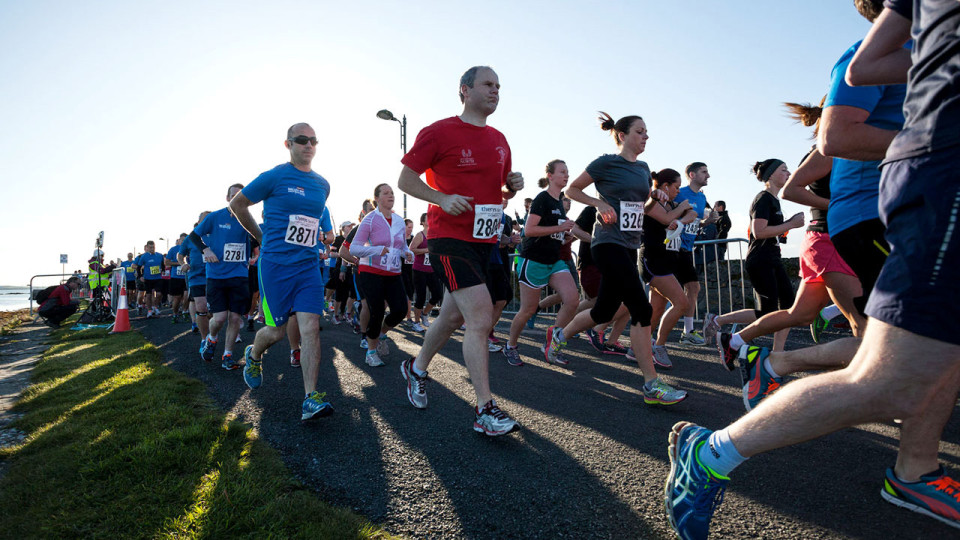So, you want to run a marathon? Congratulations! Deciding to run and complete a marathon is a big commitment. So we have prepared this quick marathon preparation guide to assist you from pre-race day up to race day itself.
Mental Preparation
Many runners take the marathon distance as a personal challenge, to put their limits to the test or to just prove that they can do it. It is not all for personal gain or selfish intentions, some run for charity too.
Whatever the reason, you have to find the “why”. Willpower and determination will only carry you that far but your “why” is going to help you through your training and on race day. Find out what is it that is really driving you, write it down, hold on to it and constantly remind yourself of it in the months to come.
Learn to cultivate self-discipline as well. When your body says no and when you’re low on motivation, know that you have committed to this and that you have to get your training runs in.
Physical Preparation
Get physical clearance. Before embarking on this life changing experience, consult your physician for any physical limitations.
Training mileage is high. Before committing to a marathon, it is advised to have a strong base of mileage. Running consistently over a few months (about 20-30km a week) is a good start. Join a few 5km, 10km or even half marathons to get the feel of it. With a solid base, transitioning to marathon training would be easier.
Injuries usually arise when you do too much too soon. Be aware of your own limits and train accordingly.

Training Routine
Your marathon training plan will depend heavily on your fitness level. It can range from anywhere between 12-20 weeks of preparation.
These are the basic elements in a standard marathon training plan:
Easy Runs
Performed on most days of the week. This will be the base where you build on your weekly mileage. The average runner should have a mileage of at least 60-80km per week in order to finish comfortably. Easy runs are performed at a pace whereby you are still able to hold a conversation. The build-up to the peak mileage during training should be gradual. Doing too much too soon is a recipe for disaster.
Quality Runs
This includes tempo and interval runs.
Tempo Runs
Tempo runs are done at a comfortably hard pace. It is close to or about 10 seconds slower than your 10km race pace. Tempo runs are done at your lactate threshold, the highest speed at which your blood lactate levels remain steady. It places just enough stress for the body to raise the lactate threshold. Tempo runs prepare the body and the mind to adapt to hard running over longer distances. It also works to build on endurance. These runs are usually performed continuously for a certain distance or time. For example, 8km done at threshold pace or 30 minutes of running at threshold pace.
Interval Runs
Interval runs improve your VO2 max – the maximum volume of oxygen that your blood can deliver to your muscles when running at high speed. This type of training aims to increase tolerance against lactic acid build up and allows lactic acid to be cleared more efficiently. This results in improved speed and performance. These runs are done at hard running paces over shorter distances with recovery phases in between each bout. For example, 5 x 1km repeats with 2-3 minutes of recovery between repeats.
Long Runs
Long runs of about 20-30km should be done once a week. You can start off with 18km and slowly make your way to a maximum of 30km. It is not advisable to go beyond 30km as it places unwanted stress on the body.
You can play around with the paces during a long run. You can start the first 20km at an easy pace, followed by the last 5km at your marathon pace. This will help your body to adjust to longer distances, train your mind to push in a fatigue state and enhance the use of fat as fuel.
Strength Training
Running a marathon is not all about running. Incorporate some strength training to strengthen your core, legs and improve on overall posture and running efficiency. A strong core will help you to hold proper form over longer distances.
Rest, Cross Training and Recovery
Many people tend to underestimate the importance of REST. It is where the “magic” happens. Rest allows the muscles to recover and also keeps injuries at bay. Cross-training comes in when you need a mental break from running while maintaining your aerobic fitness (cycling, swimming etc.). You can also cross-train on your active recovery days. This will improve blood circulation to the muscles without putting additional stress on them.
Nutrition
Nutrition is essential for a healthy body. It becomes even more important when you’re training for a marathon. Eating proper foods can give you the energy and fuel you need to survive your training.
There is no one size fits all nutrition plan. Eat a wide variety from the main food groups: Carbohydrates, Proteins and Fats. You have to adjust your nutrition intake depending on your training volume. Remember to eat enough (not too much) to fuel your training and to recover before your next session.
A general guideline: 65% Carbs; 10% Proteins; 20-25% of Unsaturated Fats.
Choose complex carbohydrates (whole wheat bread, sweet potatoes, brown rice) and good sources of protein (fish, turkey, chicken, lean beef, low fat milk, yoghurt ).
Make sure you are taking in adequate amounts of vitamins and minerals (Calcium, Iron, Zinc, Magnesium etc.) too .
Your post-workout meal is just as (if not more) important as all your other meals. A good mix of carbs and proteins should do the trick. This would help replenish muscle glycogen stores and aid in muscle building. Try not to go too long without eating (within the next 30min – 1h after your workout when protein and glycogen synthesis is highest) as this could delay recovery rate and your body may start to breakdown muscle tissue.
It is not always convenient to eat within that time frame and you may not have an appetite to do so. The solution? Pack your favourite snack (preferably healthy)!
Hydration
Always remember to drink before and after your run, especially if the weather is hot. It is also good to hydrate throughout the day. Avoid over-drinking. A good measure is to drink when you’re thirsty. Your thirst mechanism is well developed and sensitive, it is good to obey it!
Lifestyle Changes
Sleep
Sleep is a big part of training. If you don’t have enough sleep, your body cannot recover from the stress of training. Training is the stress that is placed on our bodies for it to adapt; adaptations that will ultimately make us faster, stronger and fitter. All these take place when we are sleeping and resting.
Without adequate rest, you will begin to feel sore and weak which will have a negative impact on your training. This indirectly affects your self-confidence if you are unable to perform or hit particular training times.
Social
Preparing well for a marathon comes with a few sacrifices. You may have to train a little more, sleep a little more and commit your weekends to long runs. This could mean less time spent with the people around you. Make sure you surround yourself with family and friends that will support and understand your race goals. Having a good support system will complement your overall marathon training. With proper planning and time management, you need not give up much of your social life.
Fatigue
This is the number 1 feeling in marathon training: FATIGUE! You’re going to be tired, all the time. You’re going to feel lifeless.
You just have to embrace and deal with it. Get to know that feeling and work around it. It is going to be a long term relationship. Aim for at least 8 hours of sleep every day. Trust me, you will need it! You may not see it now but it will all be worth it on race day!

Choosing Your First Marathon
Race Venue
If you plan on running a stress-free first marathon, pick an event on home ground. Just thinking about where to park and where to drop off your baggage can place significant amounts of unwanted stress on you. Look up the race venue on the race guide/website before race day. Know where the designated parking spots are and other important stations (aid station, information tent, porta loos etc). When you’re familiar with the area/place, you are less likely to be filled with anxiety on race day.
Race Course
Pick a course that you will enjoy. If you enjoy hills, go for it! But if you plan to run as fast as possible, pick a relatively flat course. Whatever you choose, make sure that it is similar to the type of terrain that you trained for. For your first marathon, it is good to pick an event that is well-organised. Don’t go for low budget events where water stations/aid stations are poorly arranged throughout the course! Also, you wouldn’t want to complete your first marathon knowing that it was under or over distance. Your best bet would be to go for AIMS-certified routes. A big, well-known marathon event is always a good choice as you’ll have the crowd support!
Weather
Weather on race day affects performance. If you train mostly in hot and humid weather, don’t pick an event happening close to winter. If you plan to run overseas, go over a few days before race day to allow your body to acclimatise to the weather conditions. Make sure you wear proper attire that would suit the weather. You can’t always guarantee perfect race day weather. Hope for the best but also be prepared for the worst!
Sign Up!
After surveying and picking out the place for your debut marathon, don’t forget to sign up as soon as possible! Speaking from experience, do not procrastinate. These days, running events are very popular, especially the bigger more well-known events! It is not uncommon for these races to sell out with the first few hours!
Pre-race
Tapering
Slowly cut down on mileage 2 weeks out from race day. This is when your last long run should take place. Scale back on the intensity too so that your body is well rested and fully recovered for race day!
Carbo-Loading
Carbo-loading involves significantly increasing carbohydrate intake a few days prior to a race. There is evidence that higher pre-exercise glycogen levels delay fatigue. Although there are a few limitations on the studies performed on carbo-loading, it is safe to say that runners will benefit from it prior (final 3 days) to racing or running longer distances.
The recommended amount is 8-12g per kg per day.

Race day checklist
Proper Running Gear/Attire
What you wear on race day should have already gone through a period of “testing” during your long training runs. The GOLDEN RULE is to not try anything new on race day, from what you wear to what you eat. Make sure you have proper running shoes and Dri-Fit clothing that wicks sweat away from your skin. Opt for shorts with pockets to store your gels or carry along a small pouch. Don’t forget your race bib!
Energy Gels
Energy gels/drink are easy to carry and are useful to replenish glycogen stores on the run. This reduces the dependence on the liver for maintaining blood glucose concentration, and provides the brain and muscles with an external source of glucose. Aim to take in about 50-60 grams of carbohydrates per hour. Only take in what you have tested during your training runs to avoid stomach upsets!
Miscellaneous Items
This includes your watch, MP3 player, cap, bandanna, hair tie, lucky charm or anything that you are used to having with you during training/race day. Lay them out the night before so that you won’t forget to bring them along on race day. Sometimes, it is not the “thing” that matters but the thought of having it that gives you the sense of security.
When you’re nervous and filled with anxiety, the last thing you need is the thought of not having something that you usually run with (watch, iPod etc.). On race day, it is your mental strength that matters. A small detour from your ritual/routine could throw you into paranoia.
Setting Your Goal
The best thing about running your first marathon is that there wouldn’t be a past record for comparison. Whatever time you complete it in will be your Personal Best. Set some goals. It can be as simple as simply completing the marathon distance or maybe you have a set time to complete it. Whatever the goal, make sure that it is realistic and achievable.
Start Preparing for Your First Marathon
This is everything you need to know to complete your first marathon! Time to plan, train hard and let your body surprise you on race day! Feel the rush of adrenaline on race day and look forward to completing your first marathon.





